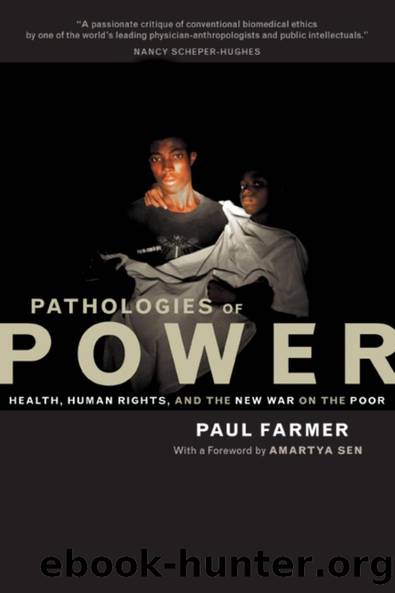Pathologies of Power: Health, Human Rights, and The New War on the Poor by Paul Farmer

Author:Paul Farmer [Farmer, Paul]
Language: eng
Format: epub
Published: 2002-11-26T18:47:35+00:00
Farmer_1-9_001-256 11/26/02 12:43 PM Page 213
CHAPTER 9
RETHINKING HEALTH
AND HUMAN RIGHTS
TIME FOR A PARADIGM SHIFT
As the global market economy pulverized traditional societies and moralities and drew every corner of the planet into a single economic machine, human rights emerged as the secu lar creed that the new global middle class needed in order to justify their domination of the new cosmopolitan order.
Kenneth Anderson, formerly of Human Rights Watch From the perspective of a preferential option for the poor, the right to health care, housing, decent work, protection against hunger, and other economic, social, and cultural necessities are as important as civil and political rights or more so.
Leigh Binford, The El Mozote Massacre Medicine and its allied health sciences have for too long been only pe ripherally involved in work on human rights. Fifty years ago, the door to greater involvement was opened by Article 25 of the Universal Dec laration of Human Rights, which underlined social and economic rights:
âEveryone has the right to a standard of living adequate for the health and well-being of himself and his family, including food, clothing, hous ing, and medical care and necessary social services, and the right to se curity in the event of unemployment, sickness, disability, widowhood, old age or other lack of livelihood in circumstances beyond his control.â1
But the intervening decades have seen little progress in the efforts to secure social and economic rights, even though we can point with some pride to gains in civil or political rights. These distinctions are crucial, as a visit to a Russian prison makes clear.
In the cramped, crammed detention centers where hundreds of thou sands of Russian detainees await due process, many fall ill with tubercu losis. Convicted prisoners who are diagnosed with tuberculosis are sent to one of more than fifty âTB colonies,â several of which Iâve described in earlier chapters. I bring up these colonies again in order to illustrate 213
Farmer_1-9_001-256 11/26/02 12:43 PM Page 214
214
One Physicianâs Perspective the difference between civil rights and social and economic rights. Imag ine a Siberian prison in which the cells are as cramped as cattle cars, the fetid air thick with tubercle bacilli. Imagine a cell in which most of the prisoners are coughing and all are said to have active tuberculosis. Let the mean age of the inmates be less than thirty years. Finally, imagine that many of these young men are receiving ineffective treatment for their dis easeâwhich, given drug toxicity, is worse than receiving a placeboâeven though they are the beneficiaries of directly observed therapy with first line antituberculous agents, delivered (however ambivalently) by Euro pean humanitarian organizations and their Russian colleagues.
If this seems hard to imagine, it shouldnât be; I have seen this situa tion in several prisons. As this book goes to press, most of these prison ers are still receiving directly observed doses of medications that cannot cure them. For many of these prisoners, the therapy is ineffective because the strains of tuberculosis that are epidemic within the prisons are re sistant to the drugs being administered.
Download
This site does not store any files on its server. We only index and link to content provided by other sites. Please contact the content providers to delete copyright contents if any and email us, we'll remove relevant links or contents immediately.
The Secret History by Donna Tartt(19053)
The Social Justice Warrior Handbook by Lisa De Pasquale(12187)
Thirteen Reasons Why by Jay Asher(8894)
This Is How You Lose Her by Junot Diaz(6877)
Weapons of Math Destruction by Cathy O'Neil(6267)
Zero to One by Peter Thiel(5787)
Beartown by Fredrik Backman(5737)
The Myth of the Strong Leader by Archie Brown(5500)
The Fire Next Time by James Baldwin(5431)
How Democracies Die by Steven Levitsky & Daniel Ziblatt(5216)
Promise Me, Dad by Joe Biden(5142)
Stone's Rules by Roger Stone(5081)
A Higher Loyalty: Truth, Lies, and Leadership by James Comey(4954)
100 Deadly Skills by Clint Emerson(4921)
Rise and Kill First by Ronen Bergman(4780)
Secrecy World by Jake Bernstein(4741)
The David Icke Guide to the Global Conspiracy (and how to end it) by David Icke(4709)
The Farm by Tom Rob Smith(4502)
The Doomsday Machine by Daniel Ellsberg(4484)
